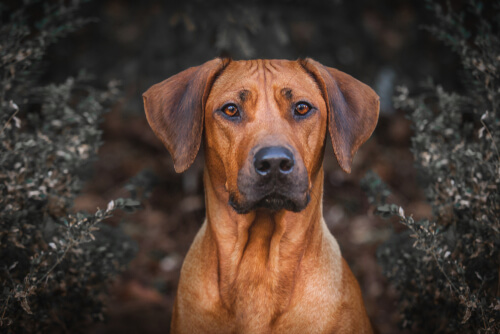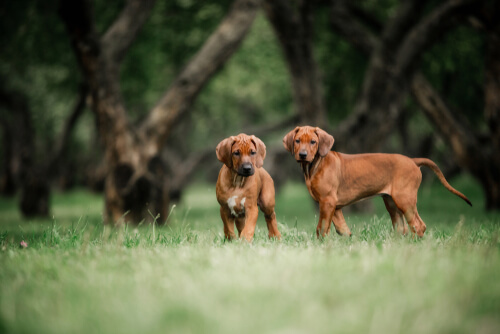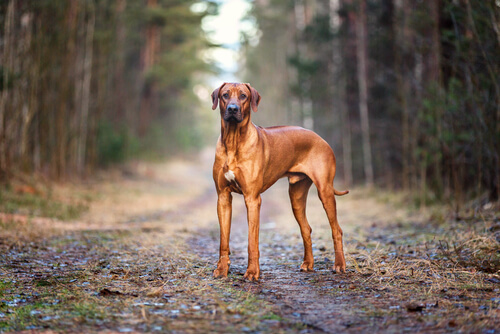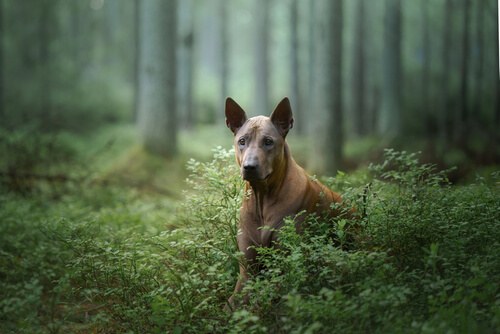
| Kingdom | Animalia |
| Phylum | Chordata |
| Class | Mammalia |
| Order | Carnivora |
| Family | Canidae |
| Genus | Canis |
| Species | Canis lupus |
| Subspecies | Canis lupus familiaris |
| Niche | Domestic |
| Height | 25-27 in (64-69 cm) |
| Weight | 80 lb (36.5 kg) |
| Lifespan | 11 years |
| Social Structure | Social, domesticated |
| Breed Status | Popular |
| Average Litter Size | 8-10 |
| Main Food Item | Dog food |
The Basics
The Ridgeback, or Rhodesian Ridgeback, is a large breed of domestic dog. Not to be confused with the Thai Ridgeback, a similar breed also named after its distinctive stripe or ‘ridge’ of backward-growing hard on its back, the Rhodesian Ridgeback was bred in Africa and named after the unrecognized state of Rhodesia (now Zimbabwe) in which the first breeding program was undertaken. It is a member of the hound family and was bred for tracking large prey such as lions. However, they are now popular family pets and show dogs as well.
The Ridgeback is often referred to as a “renaissance hound” due to its all-around versatility as a hunting and working dog. It is fast and powerful and weighs about 80 lbs (36.5 kg). At its shoulders, it stands about 27 inches (69 cm) tall. Rhodesian Ridgebacks are a brown or “wheaten” color with occasional white patches on their chest. They have medium-length tails and typically a black nose and muzzle, although brown variants also occur.

As Pets and Guard Dogs
Ridgebacks are loyal and intelligent, making for popular family pets. Strong-willed and large, they are best suited for experienced dog owners who can provide them with a large yard with a sturdy, high, and secure fence. They are very protective of their owners and can make excellent guard dogs with the right training. They have moderate energy levels but need plenty of activity and play, especially when younger.

Ridgebacks are people-oriented dogs and want to be wherever their owner is, making them great companions for children as well. They are sometimes reserved towards strangers but rarely aggressive unless defending its owner. Females will produce a fairly large litter of about 8-10 pups. Some puppies are born without the ridge on their backs, but they still make for excellent family pets.
Fun Facts about Rhodesian Ridgeback!
The Rhodesian Ridgeback is a popular breed for good reason. Known as a “renaissance hound”, they are versatile, attractive, and well-tempered. They also have a fascinating back story.
The Lion Hound of Africa
Another name for the Rhodesian Ridgeback is the African Lion Hound. This is due to the motivation for their breeding, which was to create an excellent hunting dog for large game. Ridgebacks were used to track and confront lions, bears, and boars. They never attacked them, however, but were skilled at keeping the lion at bay while the hunter could get a clean shot.
The Story of the Ridge
The ridge on the back of the Rhodesian Ridgeback is a very distinctive feature of this breed. Bred from a mix of European hunting dogs and African dogs (Canis africans), this ridge is a direct link to its heritage.

When Dutch settlers arrived at the Cape Peninsula in the mid-1600s, they noticed dogs kept by the locals that were ugly but were also excellent guard dogs. Its ears were erect, and it had a ridge of erect hairs along the top of its back. Within five decades of this encounter, the Europeans were using these dogs themselves.
By the mid-1800s the Europeans imported several breeds to Africa such as Bloodhounds and Great Danes. These were bred with the African dogs, resulting in “Boer hunting dogs”. According to genetic analysis, these Boer hounds are the ancestors of the modern Rhodesian Ridgeback. Early breeders noticed that the offspring of the crosses that had the ridges on their back tended to be excellent hunters so they preserved the trait. The Ridgeback is one of only three breeds of modern domestic dogs still brandishing this distinctive ridge feature.
The Other Ridgebacks
The Rhodesian Ridgeback has been a common breed in western countries for many decades. However, there are two other breeds of dogs that have this distinctive ridge feature as well. One is the Phu Quoc Ridgeback of southern Vietnam and the other is the Thai Ridgeback, which is considered to be a cross of the Phu Quoc with other breeds.
The Thai Ridgeback went largely unnoticed by the western world until recently but is now recognized as a standardized breed. They are also known as Mah Thai Lang Ahn in their native Thailand.

In general, the Thai Ridgeback and the Rhodesian Ridgeback are similar, although the Thai Ridgeback is generally about 15 pounds lighter. Thai Ridgebacks are often a lighter brown color than the Rhodesian. However, the most distinctive physical difference between Rhodesian and Thai Ridgebacks are their ears. The Thai Ridgeback’s ears are pointed and erect, and the Rhodesian’s fold over and flop to about nose level.
